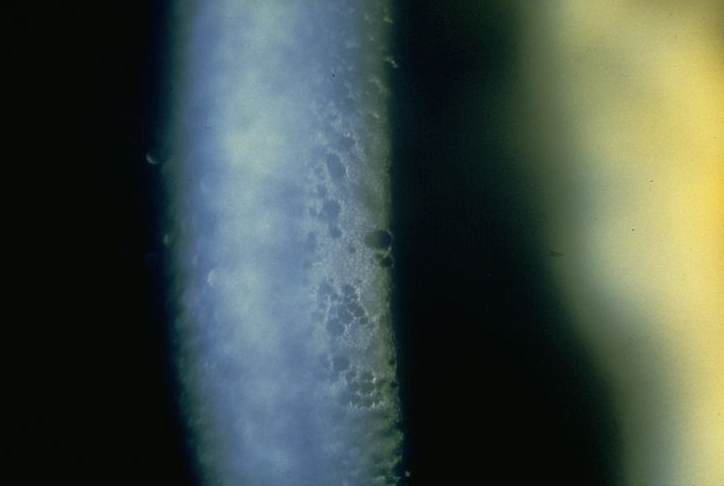Corneal guttatae is a common eye condition that affects the cornea, which is the clear, dome-shaped tissue that covers the front of the eye. It is characterized by small, irregularly shaped bumps on the inner surface of the cornea that can affect vision and cause discomfort. While corneal guttatae is typically a benign condition, it can sometimes lead to more serious complications.
Corneal guttatae is caused by a buildup of abnormal material on the inner surface of the cornea. This inner layer of the cornea, called Descemet’s membrane, is responsible for maintaining the structure and integrity of the cornea. Over time, the buildup of abnormal material can cause the membrane to become thickened and distorted, leading to the development of corneal guttatae.
Several factors may increase the risk of developing corneal guttatae, including:
- Age: The condition is more common in older adults.
- Genetics: Corneal guttatae may run in families.
- Eye trauma: Injuries to the eye can increase the risk of developing the condition.
- Certain medical conditions: Corneal guttatae may be more common in individuals with certain medical conditions, such as Fuchs’ endothelial dystrophy, which is a degenerative condition that affects the cornea.
Corneal guttatae may not cause any noticeable symptoms in its early stages. However, as the condition progresses, it can lead to several symptoms, including blurry vision, halos around lights, sensitivity to light and eye discomfort and increased glare
Corneal guttatae is typically diagnosed during a routine eye exam. An eye doctor will examine the cornea and check for any signs of irregularities or abnormalities. In some cases, additional tests, such as corneal topography or optical coherence tomography (OCT), may be necessary to assess the thickness and integrity of the cornea.
Treatment for corneal guttatae depends on the severity of the condition and the associated symptoms. In many cases, the condition does not require any treatment and can be monitored over time. However, if the condition is causing significant vision problems or discomfort, several treatment options may be available, including:
- Eyedrops: Eyedrops may be prescribed to reduce inflammation and alleviate discomfort.
- Contact lenses: Contact lenses can help improve vision by compensating for the irregular shape of the cornea.
- Corneal transplant: In severe cases, a corneal transplant may be necessary to replace the damaged cornea with a healthy donor cornea.
The prognosis for corneal guttatae varies depending on the severity of the condition and the effectiveness of treatment. In most cases, the condition is benign and does not lead to serious complications. However, in rare cases, corneal guttatae can progress to Fuchs’ endothelial dystrophy, which is a more serious condition that can lead to vision loss and require more aggressive treatment.
Corneal guttatae is a common eye condition that affects the cornea. It is caused by a buildup of abnormal material on the inner surface of the cornea and can cause blurry vision, halos around lights, sensitivity to light, eye discomfort, and increased glare. While the condition is typically benign, it can sometimes lead to more serious complications. If you are experiencing any symptoms of corneal guttatae, it is important to schedule an eye exam with an eye doctor to determine the underlying cause and develop an appropriate treatment plan.
At The Eye Center- Dr. Mahnaz Naveed Shah & Associates our team of eight ophthalmology subspecialists/ eye specialists, eye surgeons who are considered amongst the very best eye specialists in Karachi and in Pakistan, have the diagnostic and treatment capabilities to treat from the simplest to the most complex patients. We work hard to provide our patients with the best possible medical and surgical eye care, in a state of the art purpose built eye care facility. We offer the entire array of medical, laser and surgical treatments to help provide patients the best possible care in the most efficient, safe and ethical manner.
If you need an appointment, please contact us at 03041119544 during our working hours or leave us a WhatsApp message at +923028291799 and someone will connect with you. Walk-in appointments are also available for emergencies. We can also be reached through our web portal on www.surgicaleyecenter.org

